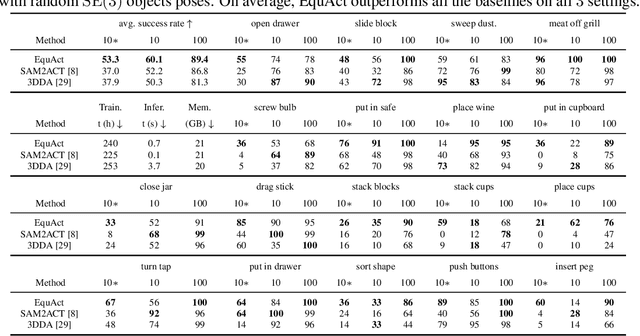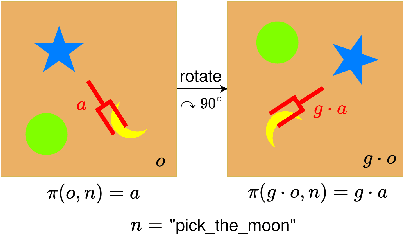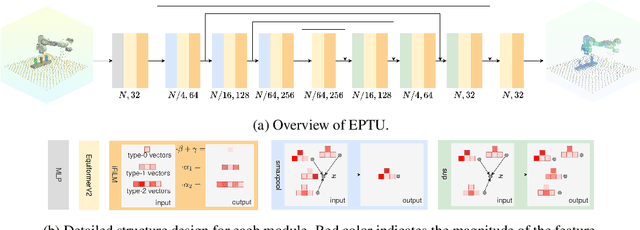Robin Walters
Smoothness Errors in Dynamics Models and How to Avoid Them
Feb 05, 2026Abstract:Modern neural networks have shown promise for solving partial differential equations over surfaces, often by discretizing the surface as a mesh and learning with a mesh-aware graph neural network. However, graph neural networks suffer from oversmoothing, where a node's features become increasingly similar to those of its neighbors. Unitary graph convolutions, which are mathematically constrained to preserve smoothness, have been proposed to address this issue. Despite this, in many physical systems, such as diffusion processes, smoothness naturally increases and unitarity may be overconstraining. In this paper, we systematically study the smoothing effects of different GNNs for dynamics modeling and prove that unitary convolutions hurt performance for such tasks. We propose relaxed unitary convolutions that balance smoothness preservation with the natural smoothing required for physical systems. We also generalize unitary and relaxed unitary convolutions from graphs to meshes. In experiments on PDEs such as the heat and wave equations over complex meshes and on weather forecasting, we find that our method outperforms several strong baselines, including mesh-aware transformers and equivariant neural networks.
DeepWeightFlow: Re-Basined Flow Matching for Generating Neural Network Weights
Jan 08, 2026Abstract:Building efficient and effective generative models for neural network weights has been a research focus of significant interest that faces challenges posed by the high-dimensional weight spaces of modern neural networks and their symmetries. Several prior generative models are limited to generating partial neural network weights, particularly for larger models, such as ResNet and ViT. Those that do generate complete weights struggle with generation speed or require finetuning of the generated models. In this work, we present DeepWeightFlow, a Flow Matching model that operates directly in weight space to generate diverse and high-accuracy neural network weights for a variety of architectures, neural network sizes, and data modalities. The neural networks generated by DeepWeightFlow do not require fine-tuning to perform well and can scale to large networks. We apply Git Re-Basin and TransFusion for neural network canonicalization in the context of generative weight models to account for the impact of neural network permutation symmetries and to improve generation efficiency for larger model sizes. The generated networks excel at transfer learning, and ensembles of hundreds of neural networks can be generated in minutes, far exceeding the efficiency of diffusion-based methods. DeepWeightFlow models pave the way for more efficient and scalable generation of diverse sets of neural networks.
Discovering Lie Groups with Flow Matching
Dec 23, 2025Abstract:Symmetry is fundamental to understanding physical systems, and at the same time, can improve performance and sample efficiency in machine learning. Both pursuits require knowledge of the underlying symmetries in data. To address this, we propose learning symmetries directly from data via flow matching on Lie groups. We formulate symmetry discovery as learning a distribution over a larger hypothesis group, such that the learned distribution matches the symmetries observed in data. Relative to previous works, our method, \lieflow, is more flexible in terms of the types of groups it can discover and requires fewer assumptions. Experiments on 2D and 3D point clouds demonstrate the successful discovery of discrete groups, including reflections by flow matching over the complex domain. We identify a key challenge where the symmetric arrangement of the target modes causes ``last-minute convergence,'' where samples remain stationary until relatively late in the flow, and introduce a novel interpolation scheme for flow matching for symmetry discovery.
On Uncertainty Calibration for Equivariant Functions
Oct 27, 2025



Abstract:Data-sparse settings such as robotic manipulation, molecular physics, and galaxy morphology classification are some of the hardest domains for deep learning. For these problems, equivariant networks can help improve modeling across undersampled parts of the input space, and uncertainty estimation can guard against overconfidence. However, until now, the relationships between equivariance and model confidence, and more generally equivariance and model calibration, has yet to be studied. Since traditional classification and regression error terms show up in the definitions of calibration error, it is natural to suspect that previous work can be used to help understand the relationship between equivariance and calibration error. In this work, we present a theory relating equivariance to uncertainty estimation. By proving lower and upper bounds on uncertainty calibration errors (ECE and ENCE) under various equivariance conditions, we elucidate the generalization limits of equivariant models and illustrate how symmetry mismatch can result in miscalibration in both classification and regression. We complement our theoretical framework with numerical experiments that clarify the relationship between equivariance and uncertainty using a variety of real and simulated datasets, and we comment on trends with symmetry mismatch, group size, and aleatoric and epistemic uncertainties.
SE(3)-Equivariant Diffusion Policy in Spherical Fourier Space
Jul 02, 2025Abstract:Diffusion Policies are effective at learning closed-loop manipulation policies from human demonstrations but generalize poorly to novel arrangements of objects in 3D space, hurting real-world performance. To address this issue, we propose Spherical Diffusion Policy (SDP), an SE(3) equivariant diffusion policy that adapts trajectories according to 3D transformations of the scene. Such equivariance is achieved by embedding the states, actions, and the denoising process in spherical Fourier space. Additionally, we employ novel spherical FiLM layers to condition the action denoising process equivariantly on the scene embeddings. Lastly, we propose a spherical denoising temporal U-net that achieves spatiotemporal equivariance with computational efficiency. In the end, SDP is end-to-end SE(3) equivariant, allowing robust generalization across transformed 3D scenes. SDP demonstrates a large performance improvement over strong baselines in 20 simulation tasks and 5 physical robot tasks including single-arm and bi-manual embodiments. Code is available at https://github.com/amazon-science/Spherical_Diffusion_Policy.
Symmetry in Neural Network Parameter Spaces
Jun 16, 2025Abstract:Modern deep learning models are highly overparameterized, resulting in large sets of parameter configurations that yield the same outputs. A significant portion of this redundancy is explained by symmetries in the parameter space--transformations that leave the network function unchanged. These symmetries shape the loss landscape and constrain learning dynamics, offering a new lens for understanding optimization, generalization, and model complexity that complements existing theory of deep learning. This survey provides an overview of parameter space symmetry. We summarize existing literature, uncover connections between symmetry and learning theory, and identify gaps and opportunities in this emerging field.
Understanding Mode Connectivity via Parameter Space Symmetry
May 29, 2025Abstract:Neural network minima are often connected by curves along which train and test loss remain nearly constant, a phenomenon known as mode connectivity. While this property has enabled applications such as model merging and fine-tuning, its theoretical explanation remains unclear. We propose a new approach to exploring the connectedness of minima using parameter space symmetry. By linking the topology of symmetry groups to that of the minima, we derive the number of connected components of the minima of linear networks and show that skip connections reduce this number. We then examine when mode connectivity and linear mode connectivity hold or fail, using parameter symmetries which account for a significant part of the minimum. Finally, we provide explicit expressions for connecting curves in the minima induced by symmetry. Using the curvature of these curves, we derive conditions under which linear mode connectivity approximately holds. Our findings highlight the role of continuous symmetries in understanding the neural network loss landscape.
EquAct: An SE(3)-Equivariant Multi-Task Transformer for Open-Loop Robotic Manipulation
May 27, 2025



Abstract:Transformer architectures can effectively learn language-conditioned, multi-task 3D open-loop manipulation policies from demonstrations by jointly processing natural language instructions and 3D observations. However, although both the robot policy and language instructions inherently encode rich 3D geometric structures, standard transformers lack built-in guarantees of geometric consistency, often resulting in unpredictable behavior under SE(3) transformations of the scene. In this paper, we leverage SE(3) equivariance as a key structural property shared by both policy and language, and propose EquAct-a novel SE(3)-equivariant multi-task transformer. EquAct is theoretically guaranteed to be SE(3) equivariant and consists of two key components: (1) an efficient SE(3)-equivariant point cloud-based U-net with spherical Fourier features for policy reasoning, and (2) SE(3)-invariant Feature-wise Linear Modulation (iFiLM) layers for language conditioning. To evaluate its spatial generalization ability, we benchmark EquAct on 18 RLBench simulation tasks with both SE(3) and SE(2) scene perturbations, and on 4 physical tasks. EquAct performs state-of-the-art across these simulation and physical tasks.
3D Equivariant Visuomotor Policy Learning via Spherical Projection
May 22, 2025Abstract:Equivariant models have recently been shown to improve the data efficiency of diffusion policy by a significant margin. However, prior work that explored this direction focused primarily on point cloud inputs generated by multiple cameras fixed in the workspace. This type of point cloud input is not compatible with the now-common setting where the primary input modality is an eye-in-hand RGB camera like a GoPro. This paper closes this gap by incorporating into the diffusion policy model a process that projects features from the 2D RGB camera image onto a sphere. This enables us to reason about symmetries in SO(3) without explicitly reconstructing a point cloud. We perform extensive experiments in both simulation and the real world that demonstrate that our method consistently outperforms strong baselines in terms of both performance and sample efficiency. Our work is the first SO(3)-equivariant policy learning framework for robotic manipulation that works using only monocular RGB inputs.
A Practical Guide for Incorporating Symmetry in Diffusion Policy
May 19, 2025Abstract:Recently, equivariant neural networks for policy learning have shown promising improvements in sample efficiency and generalization, however, their wide adoption faces substantial barriers due to implementation complexity. Equivariant architectures typically require specialized mathematical formulations and custom network design, posing significant challenges when integrating with modern policy frameworks like diffusion-based models. In this paper, we explore a number of straightforward and practical approaches to incorporate symmetry benefits into diffusion policies without the overhead of full equivariant designs. Specifically, we investigate (i) invariant representations via relative trajectory actions and eye-in-hand perception, (ii) integrating equivariant vision encoders, and (iii) symmetric feature extraction with pretrained encoders using Frame Averaging. We first prove that combining eye-in-hand perception with relative or delta action parameterization yields inherent SE(3)-invariance, thus improving policy generalization. We then perform a systematic experimental study on those design choices for integrating symmetry in diffusion policies, and conclude that an invariant representation with equivariant feature extraction significantly improves the policy performance. Our method achieves performance on par with or exceeding fully equivariant architectures while greatly simplifying implementation.
 Add to Chrome
Add to Chrome Add to Firefox
Add to Firefox Add to Edge
Add to Edge